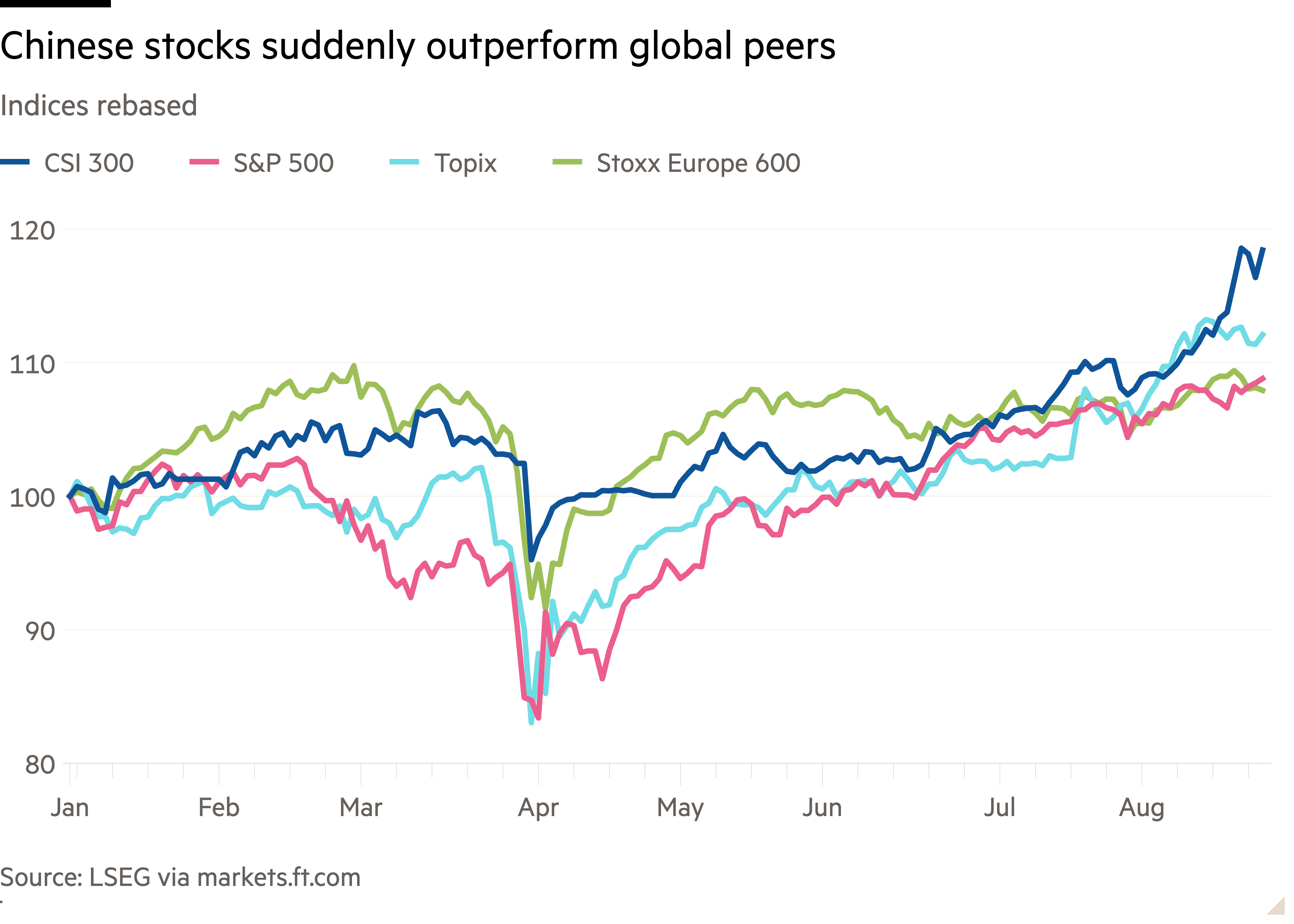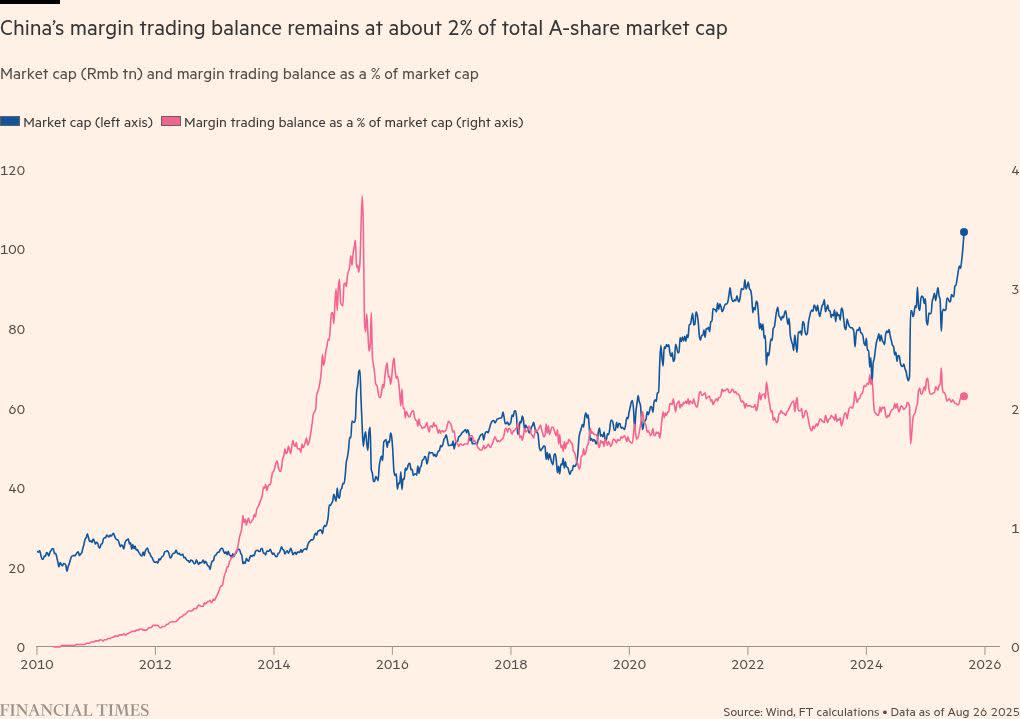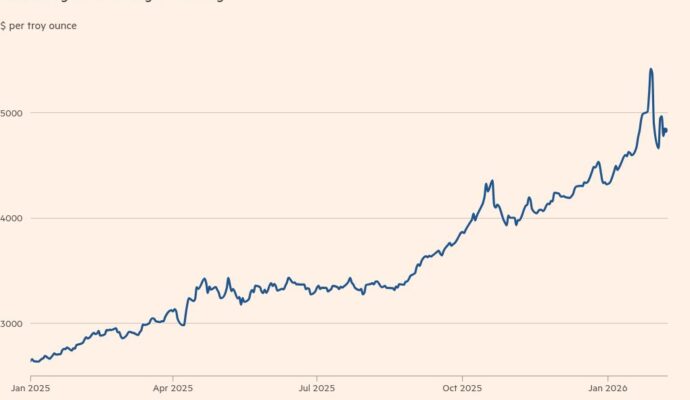Unlock the Editor’s Digest for free
Roula Khalaf, Editor of the FT, selects her favourite stories in this weekly newsletter.
Chinese investors are driving a sharp rally in the country’s stock markets, even as international investors have been deterred by years of underperformance and persistent deflationary pressures.
The mainland’s CSI 300 benchmark index traded flat in the first six months of this year but has posted double-digit gains since the end of June. It is now up 14.3 per cent so far this year, more than the main US, European and Japanese benchmarks, in local currency terms.
Easing trade tensions with the US has calmed investors’ nerves. But analysts say it is primarily low interest rates, near-record low bond yields and a lack of attractive alternatives that have driven Chinese retail and institutional investors into A-shares, traded on the country’s onshore stock markets.
“For households and institutions in China, they don’t have too much choice,” said Shujin Chen, China economist and head of China financial and property research at Jefferies. “A-shares have joined the global party.”
Stock markets in the US, Japan and Europe are trading at all-time highs as investors pile into equities, defying the warnings of many economists about the negative impact that US trade policy will have on global growth.

While still below its all-time high during China’s post-Covid boom in 2021, the rally in the CSI 300 this year is close to the 14.7 per cent gain recorded for the whole of 2024, which followed three years of losses.
Some analysts have pointed to Beijing’s campaign against deflation as a big driver of the rally. Others are more cautious, however, saying the campaign will only deliver higher earnings in some sectors.
Bush Chu, a China equity portfolio manager at Aberdeen, instead points to the amount of money flowing around China’s financial system, partly as a result of loose monetary policy aimed at tackling lacklustre growth.
“The overarching reason is easing monetary policy since last year,” said Chu. “Initially, we saw that liquidity go into the bond market. [But with] the 10-year yield dropping to an unattractive level, and with deposit rates coming down, there are fewer options.”
The moribund state of China’s real estate market, once a preferred investment choice for households, has simultaneously boosted the amount of cash looking for assets to invest in and narrowed the range of options available.
“[Households are] not borrowing to buy properties any more, so there’s plenty of excess cash in the system,” said Hao Hong, chief investment officer at Lotus Asset Management.
Despite the strong rally in A-shares, international investors have stayed largely on the sidelines. For them, the US currency’s weakness against the euro and the yen this year has delivered stronger gains in dollar terms for European and Japanese equities than for Chinese ones.
“We haven’t seen a significant impact from foreign flows,” said Vincent Che, head of equities at Ping An of China Asset Management (Hong Kong).
Domestic investors, however, have piled in. In a sign of their enthusiasm, the amount of margin trading, in which investors borrow money to buy stocks, has risen 19 per cent in the past two months to Rmb2.2tn ($308bn). That is the highest level since 2015, when Chinese state media urged retail investors to buy stocks as part of the government’s drive for economic growth — only for the rally to end in a stock market crash the following year.
But analysts said that since then, changes in stock market structure and more targeted government policies meant that the worst excesses of that bubble would not happen this time.
“It’s very different,” said Kinger Lau, chief China equity strategist at Goldman Sachs. “We are in a more moderate rally now.”
The amount of margin trading in relation to total market value, for example, is much lower than it was a decade ago.
“There’s nothing about Chinese valuations which to me look like they’re in a bubble,” said Alexander Treves, investment specialist at JPMorgan Asset Management.
Analysts said massive co-ordinated share buying by Chinese state-owned funds and companies earlier this year had helped set the foundation for the current rally, by signalling a floor on asset prices. A policy last year mandating the country’s insurance industry to buy more equities has also supported the market.
China’s rally comes even as enduring deflation threatens to erode corporate earnings. Factory gate prices fell 3.6 per cent year on year in July and have fallen every month since October 2022.
This has prompted caution among some foreign investors, who see better opportunities for earnings growth in markets such as Japan, where bets that recent corporate governance reforms will bear fruit have pushed the Topix to record highs.
“I would much rather be focused on an earnings-driven market,” said John Woods, chief investment officer for Asia at Lombard Odier.



